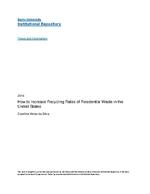|
|

Notes
- Abstract:
- During the past 20 years, most US households did not engage in any type of program to manage their waste. Consequently, the United States’ wealth and prosperity generated the problem of waste production during the 1990s. The economist Michael McDonough discovered that the US waste production has an 82% correlation to the US economic growth. As a household’s income increased, their waste production also increased. As a result, household waste was deposited in landfills, causing many areas to be confronted with a growing scarcity of landfill capacity. A great way to solve this problem of waste production is by recycling, as it removes potentially useful materials from waste and processes them into the production of new products. Therefore, the primary purpose of this study is to identify the appropriate tools and incentives the American government can implement to increase recycling rates of residential waste. This study demonstrated that improvements in landfill and combustion waste taxes and waste collection charges can potentially increase the recycling rates of residential waste in the United States.
- Thesis:
- Thesis (Honors)--Barry University, 2016.
- Bibliography:
- Includes bibliographical references (leaves 37-40).
Record Information
- Source Institution:
- Barry University
- Holding Location:
- Barry University Archives and Special Collections
- Rights Management:
- Copyright Caroline Alves da Silva. Permission granted to Barry University to digitize, archive and distribute this item for non-profit research and educational purposes. Any reuse of this item in excess of fair use or other copyright exemptions requires permission of the copyright holder.
- Resource Identifier:
- TD794.5.A58 2016 _AlvesDaSilvaCaroline ( BU-Local )
- Classification:
- TD794.5.A58 2016 ( lcc )
|
|